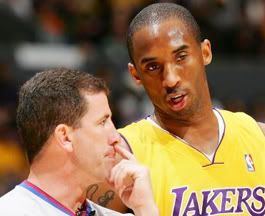
"That was a three you hit right? Yes, I saw your toe on the line, let's just agree it was a three and move on."
I wrote a post about the stupidity of resistance to putting an NBA team in Las Vegas, and I still believe this to be true. Players are paid well enough to avoid these types of things.
The one facet I never thought of was the potential corruption of NBA referees. 15-year NBA referee Tim Donaghy is currently being investigated by the FBI for point shaving, mob connections and other no-good activities.
The NBA is obviously in a huge pickle. In a sport, integrity is at the top of things a sports league must have to survive as a valid competition. It's the reason Major League Baseball is trying to distance itself from Barry Bonds. It's the reason there was a fuss about Wayne Gretzky's wife's involvement in a gambling ring. It's the reason Roger Goodell is punishing criminal NFL players for acting the fool. It's the reason the Tour de France is trying its best to crack down on dopers. You just can't have any question in the general public's mind that the players aren't being true to the game.
So, in a time that's about as inconvenient as it can be, the NBA finds itself having to answer questions about corruption. Following a very tumultuous playoffs, where many fans feel that the Western Conference Semifinals between the Spurs and Suns was tainted, the outcome of many games is being questioned as potentially tainted as well.
So, how do you fix this? One suggestion is to raise referee salaries. Making between $100,000 and $300,000 a year, NBA referee salaries are a drop in the bucket compared to the players they officiate. It's a dastardly situation for all involved. Unless you start paying them close to what the average player makes ($5.2 million/year on average), that isn't going to work. With games having the potential of millions of dollars riding on the outcome, the incentive to side with the seedier side of life is still strong.
They could hire more surveillance on officials, but they already do quite a bit to monitor their bank accounts and police within. So, I have a simpler solution.
Do nothing.
OK, maybe not absolutely nothing, but don't change any fundamental ways that they deal with officials. Push a hard public-relations campaign to try and convince the public that your league isn't corrupt. Up referee salaries by 10 percent to dupe the public into thinking that will make a difference. They are kinda dumb, after all.
But honestly, there isn't really anything you can do other than screening the people you hire and following their financial moves as much as possible. There will be a public outcry about this situation, but it's an isolated incident, and that's what the NBA has to focus on for damage control. Many columnists will call for the overhaul of the system that the NBA uses in monitoring and hiring its referees, but this isn't the solution. If the NBA focuses on more than promoting this as an isolated incident, they are giving in more than they should and will ultimately wish they hadn't. They should also tack on some PR about improving officiating on the court, which is really what NBA fans want anyway.
In the end, this will probably be a stink that doesn't die for some time, let's just hope it's the only stink.
 Reasonably yours,
Reasonably yours,Scooter
E-mail us

 Travis
Travis

 Kenneth
Kenneth


